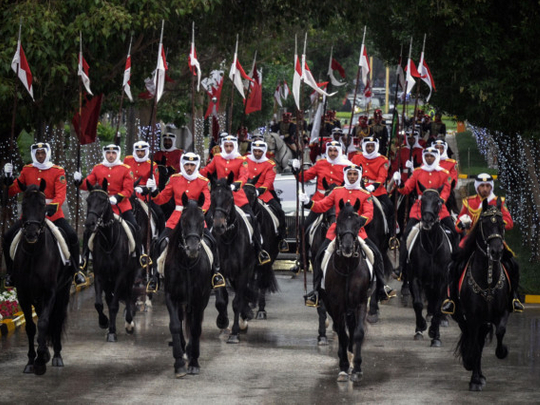
Manama: Bahrain will remain a country of law and institutions, freedoms and tolerance, King Hamad Bin Eisa Al Khalifa said as his country celebrated its 41st national day and the 13th anniversary of the king’s accession to the throne.
“Our glorious National Day is a celebration of all the political, constitutional and economic revitalisations and development in our country from the date Bahrain was founded as an independent, Muslim and Arab state in the era of our grandfather Ahmad Al Fatih in 1783, more than two centuries ago, up to the present time,” King Hamad said in his speech at the University of Bahrain.
“We recall on these auspicious occasions the majestic legacy of our fathers and grandfathers. They built a safe and peaceful country based on love, tolerance and moderation, and Bahrain will remain a country of law and institutions and freedoms and tolerance between various religions and cultures,” he said.
King Hamad, 60, paid tribute to “the loyal citizens who devoted their lives to education”.
“We have attended this ceremony to honour them at this university, where Bahrain achieved an outstanding status thanks to its leadership in education and has made great strides in the basic education for all and in providing the best educational services for all members of society.”
The Bahraini monarch who succeeded his father Shaikh Eisa Bin Salman Al Khalifa in March 1999 announced the establishment of a fund for needy students.
The Shaikh Eisa Bin Salman Al Khalifa Fund will be for needy students in undergraduate and graduate studies and will help them achieve a better future through education and knowledge, he said.
“This is the first fund in the Kingdom of Bahrain to serve all citizens without distinguishing between religions, sects or cultures. An elite of eminent men and women with sound experience in philanthropy and endowments will oversee the fund, develop its resources and guide it to serve students,” he said.
King Hamad called on all Bahrainis “to move forward, to be diligent for the sake of further accomplishments and to continue the nation-building process in various fields in order to achieve the well-being of all citizens”.
He also welcomed the launch of direct communication between various civil society organisations and formations to help overcome the political and social crisis that hit the country since the dramatic events of February and March last year.
“The continuity of communication and the discussion of different visions with transparency and with keenness on a national consensus without any external interference has always been a pure Bahraini feature,” he said.
Bahrain has repeatedly insisted that the issue was a purely domestic matter and that Bahrainis were capable of addressing it without involving other parties, states or international organisations.
Lawmakers, academics and religious figures welcomed the establishment of the Shaikh Eisa Bin Salman Fund for students in need or with special needs.
“It is a very generous and noble gesture that will certainly help students who are incapable of fulfilling their dreams and continuing their studies because of their terrible financial conditions,” Shaikh Abdul Mohsin Al Asfoor, a religious figure, said.
Shaikh Salah Al Jowder, also a religious figure, said that he fully appreciated the nature of the fund.
“It is for all Bahrainis, regardless of their religious affiliations or social background. This fund will be a strong motivation to assist all those in need or who have special needs,” he said.
Haya Al Nuaimi, the college of art dean, said that students with special needs would greatly benefit from the fund “because they need specific care and facilities”.
MP Lateefa Al Gaood stressed the significance of a Bahraini dialogue without foreign interference.
“We Bahrainis know one another much better than any non-Bahraini,” she said. “We know what drives us, how we think and how we can communicate. We do not need any intermediary. In fact, any role for a non-Bahraini would complicate matters. No foreigner can be keener than a Bahraini on our country and on the rights of its people,” she said.












